Iranian Seminary Scholars Say Elections Lost Meaning
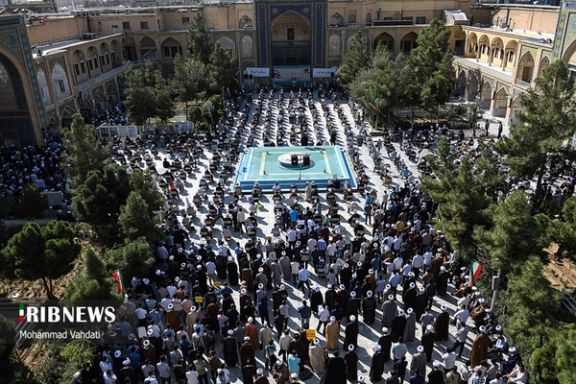
The Assembly of Qom Seminary Scholars and Researchers of Iran has claimed "the elections have lost their meaning" in the country on the eve of the upcoming polls in the country.

The Assembly of Qom Seminary Scholars and Researchers of Iran has claimed "the elections have lost their meaning" in the country on the eve of the upcoming polls in the country.
The group also announced its decision to abstain from providing a list for the introduction of candidates for the Assembly of Experts and the parliament.
The proclamation comes in the wake of a recent round of elections marked by what the organization describes as a “narrow-minded approach leading to broader restrictions, leaving many citizens disheartened and disillusioned, ultimately turning them away from the ballot boxes.”
The Assembly highlighted the significant decline in voter participation in several recent elections, the government continually narrowing the field of choice for the electorate.
The Assembly branded the government ineffective amid mass discontent, pointing out that “the capabilities of electoral, legislative, and executive institutions have been restricted, rendering people's choices ineffective.”
The organization called for “a restoration of meritocracy in governance, urging rulers to abandon the current mode of governance to restore confidence in the electoral process and encourage greater participation among citizens.”
Meanwhile, various political groups, including the Reform Front, comprising more than two dozen reformist parties, have declared their refusal to participate in the upcoming elections, citing concerns about its lack of competitiveness and fairness.
The upcoming parliamentary and Assembly of Experts elections, scheduled for March 1, are anticipated to witness historically low voter turnout, reflecting a crisis of legitimacy for the Islamic Republic.
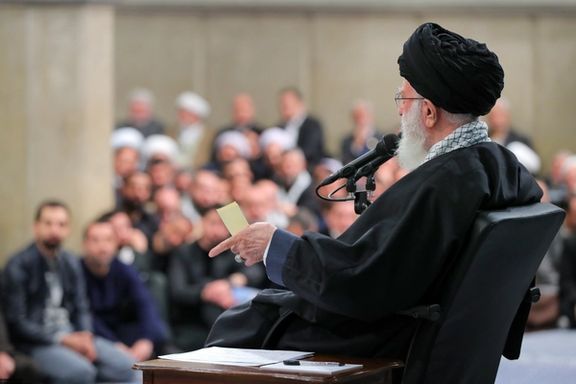
Iran's Supreme Leader Ali Khamenei has once again criticized other Islamic countries for not severing all relations with Israel, and called for the destruction of the Jewish state.
During a speech on Thursday, Khamenei reiterated his belief in political Islam and Islam as the cornerstone of social structure, accusing heads of Islamic states of failing to follow the teachings of the Quran regarding Gaza. He stated, "The Almighty God will question the Muslim nations because they did not put pressure on their governments to stop supporting the Zionist regime as well as the Islamic governments because they did not follow the Quranic orders."
Khamenei questioned the actions of leaders of Muslim countries, asking whether they are adhering to the Quran's commandment not to “establish connections with the enemies of God and enemies of Muslims? And why the heads of Islamic countries are not openly severing their ties with the murderous Zionist regime and stopping to help that regime?" he asked while stressing that the Gaza war is the biggest current issue of the Islamic world.
Iran's leader also claimed that those who are fighting Israel, who he called the brave Resistance movement, are enacting the teachings of the holy book of Islam and promised that the “Zionist cancerous tumor” would be overthrown and destroyed.
Although Khamenei did not directly mention militant forces acting as proxies for Iran, such as the Houthis in Yemen, he has previously in early November called on Muslim nations to blockade Israel. While initially cautious about the Gaza-Israel conflict, Khamenei later urged Muslim states with political connections to Israel to temporarily sever ties. He also advocated for an Islamic oil and food embargo on Israel to force a ceasefire amid the conflict sparked by Hamas attacks in October.
After his call for a blockade of Israel, Houthis began firing missiles and drones on commercial and even naval vessels in the Red Sea region, disrupting global shipping. The United States and Britain have launched retaliatory air strikes at Houthi military installations.
"Some Islamic governments have condemned Israeli crimes in assemblies while others have not. This is unacceptable," Khamenei said in a speech to students on November 19 in which he also claimed that Israel had been defeated by Hamas. It was unclear which nations he was referring to as countries across the Arab world had all stood by Gaza in the wake of the war declared by Hamas on October 7.
Some Islamic countries including Turkey and Jordan expelled Israeli envoys after the conflict began, but Bahrain’s Crown Prince and Prime Minister Salman bin Hamad Al Khalifa became the first Arab leader on November 19 to “unequivocally” condemn the Hamas attacks on Israel and urge the militants to release Israeli hostages.
On February 8, Khamenei reiterated his call for a blockade of Israel. “It is the duty of the governments to cut off political, propaganda and arms aid and not to send consumer goods to the Zionist regime,” Khamenei said.
Tehran has avoided any direct military involvement in the Israel-Hamas conflict but has used its proxy groups such as the Houthis and Hezbollah to attack Israeli and American targets in the region in the wake of the October 7 Hamas attack. There were more than 160 rocket and drone attacks on American forces stationed in Iraq and Syria since mid-October, until the US launched air strikes against dozens of target in late January.
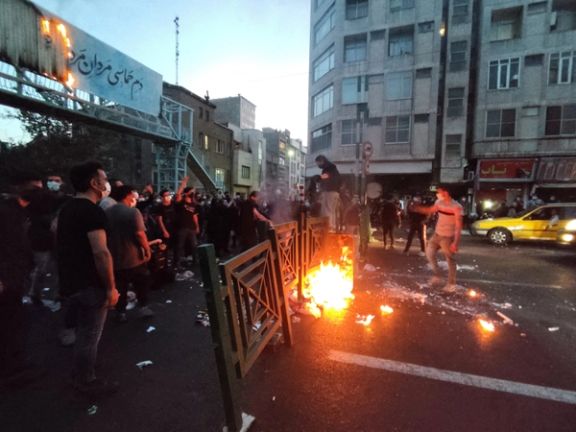
A leaked document originating from Iran's judiciary servers has revealed detailed charges against 25 people allegedly involved in the Mahsa Amini protests.
Six of the accused are alleged to have been “preparing Molotov cocktails with intent to attack military and government centers,” while three others are charged with “collaborating with the Kurdistan Democratic Party of Iran” and allegedly threatening officials. Others are charged with possessing firearms.
Dated October 18, 2022, the document, leaked by the hacker group Edalat-e Ali, was addressed from the Counter-Espionage Deputy of the Ministry of Intelligence to the Minister of Interior, outlining charges against detainees spread across Iran.
In the wake of the death of 22-year-old Mahsa Amini while in the custody of Iran's morality police in September 2022, the nation experienced widespread protests. Reports indicate that within a matter of weeks, over 500 demonstrators lost their lives at the hands of the regime's security forces. Tens of thousands more were arrested and imprisoned, others sentenced to death.
Edalat-e Ali claims to have accessed millions of files and classified documents, subsequently making three million hacked judiciary files available on an open website, accessible for public scrutiny, which has since drawn massive interest at home and abroad.
It's the latest hacking scandal to hit the government in recent years, showing the country's vulnerability to cyberattacks at home and abroad, with experts warning the attacks will continue in spite of the regime's efforts to lock down internet freedoms.

Iran's former president, Hassan Rouhani, has again appealed to the Guardian Council to demand answers as to his disqualification in the upcoming Assembly of Experts elections.
According to Rouhani's official website, he submitted his request on Wednesday, underscoring the lack of response to his two previous inquiries as the basis for his latest request.
The announcement of Rouhani's disqualification was made on January 24th, as he currently holds a position as a member of the Assembly of Experts, the deliberative body empowered to appoint the Supreme Leader of Iran.
In response to his disqualification, Rouhani had previously called on the public to actively participate in the forthcoming elections and cast what he termed a "protest vote."
Hadi Tahan Nazif, spokesperson for the Guardian Council, addressed the council's silence regarding Rouhani's letters, claiming that their priority is to review the eligibility of those who have lodged complaints. He said that they will address Rouhani's inquiry, emphasizing it as his legal right.
Amidst the debacle, the state-run news agency IRNA last month denied the lodging of a formal complaint, while Alireza A’arafi, a member of the clerics of the Guardian Council, responded to Rouhani's latest letter, acknowledging the call for a swifter response and assuring that they will promptly address the matter.
The instance is not the first time the Guardian Council has invalidated the eligibility of a former president for elections. Akbar Hashemi Rafsanjani and Mahmoud Ahmadinejad both faced similar disqualifications for presidential elections.
The upcoming sixth round of Assembly of Experts elections is scheduled for March 1, 2024, concurrently with the twelfth parliamentary elections.
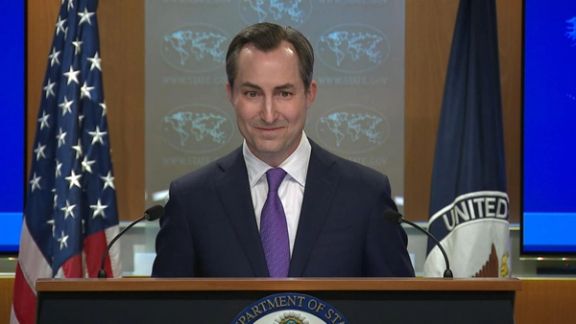
The United States has called Iran's decision to ban the use of virtual private network (VPN) services a "reminder of how much the Iranian regime fears its people".
Spokesman Matthew Miller made the comments amid Iran's lowest ebb, when on the eve of next month's elections, turnout is expected to be the lowest in the history of the Islamic Republic.
Miller said the government fears "what they [Iranians] are capable of when they are given unfettered access to the internet and information", the 2022 uprising and its subsequent rejection of the government reflecting the power of the people in the face of the country's tyrannical regime.
Blaming Tehran for “choking off information that people need to make decisions about their lives and decisions about their futures,” Miller stressed that the regime’s policies to restrict the virtual space have harmed businesses and cost Iran’s economy billions of dollars.
Iran’s National Virtual Space Center announced a resolution banning the use of VPNs in the country on Tuesday, approved by Supreme Leader Ali Khamenei.
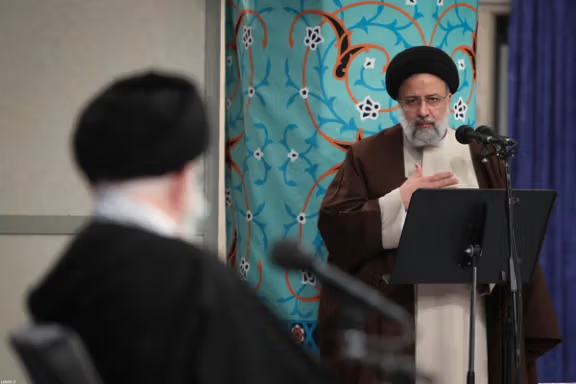
“Employing VPN devices is prohibited, except for those with a legal permit,” the resolution stated, without specifying who will be eligible for the permits and what actions and purposes will be allowed under the new law.
During the press conference, Miller also vowed that Washington will continue its support for internet freedom in Iran, an integral part of the US campaign to further the cause of human rights in the country.
“In the height of the protests in 2022 and 2023, as many as one in three Iranians used US-supported anti-censorship and digital security tools such as VPNs. There are millions of Iranians that have continued to use those tools to this day,” Miller went on to say.
Since the Women, Life, Freedom uprising, sparked by the death in morality-police custody of Mahsa Amini, the likes of Instagram and Whatsapp have been banned. For millions of small businesses, it has been crippling. Many small businesses depend on such platforms, not least, women in remote regions.
Miller’s remarks come against the backdrop of mounting criticisms against US President Joe Biden over his policies regarding Tehran. Many Iranian activists and opposition figures, as well as American politicians, accuse the Biden administration of being too lenient towards Iran.
Iran's disruption of VPN networks has been coupled with an ongoing surge in internet crackdowns to silence opposition voices. The disruptions have led to decreased internet access speed, exacerbating concerns over online censorship and surveillance in Iran.
The latest bans come amid a broader crackdown on internet freedom activists. Among those detained is Youssef Ghobadi whose unofficial detention has sparked widespread outcry, along with the arrest of another activist known as "Segaro," who was active on the X platform. The two had been working to develop and distribute circumvention tools such as VPNs to help Iranians bypass internet censorship.
In last year's Freedom House report, the NGO stated "Iran experienced the worst score decline among the countries assessed, driven by the authorities’ disproportionate and violent crackdown on nationwide anti-government protests". It noted that "the government also shut down internet services, blocked WhatsApp and Instagram, and expanded its repressive surveillance apparatus".
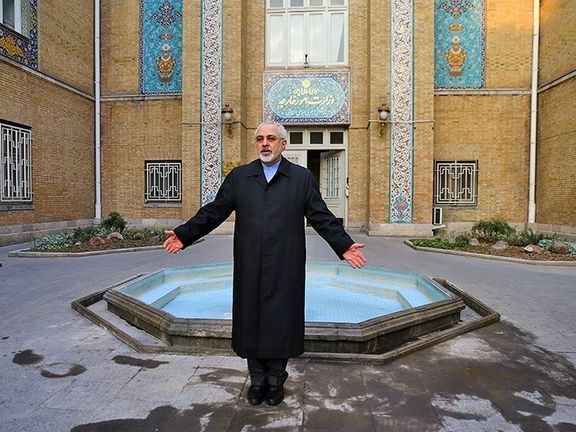
Iran’s former foreign minister has claimed that many in the country believe Iran's 1979 revolution is “unique in world history” as the regime claws for legitimacy on the eve of elections.
Mohammad Javad Zarif who was speaking at a conference held at Tehran University stated, “various observers have pointed out that Iran's revolution stands apart from others because it was not led by a political party or armed group”, hailing the religious nature of the revolution which ousted the ruling monarchy.
His remarks come at a critical juncture as Iran commemorates the 45th anniversary of the Islamic Revolution, coined by its founder, Ruhollah Khomeini, as the revolution of the "bare-footed."
However, the occasion is overshadowed by growing disillusionment among the populace with the regime's shortcomings and fears the upcoming elections will be boycotted en masse as a sign of the country’s discontent amid ever more social and economic repression.
Traditionally, the Islamic Republic celebrates the Ten Days of Dawn (dahe-ye fajr), marking the period from Ayatollah Khomeini's return to Iran on February 1, 1979, to the victory of the Islamic Revolution.
However, this year's observance was fraught with challenges, including the ongoing inflation and increasing reluctance to address the unfulfilled promises of freedom and prosperity made during the revolution.
Poverty has never been as bad as the current depression, an all time low since 1979.
Official figures from the interior ministry suggest that approximately 60% of Iran's 84 million citizens live below the relative poverty line, with between 20 to 30 million enduring "absolute poverty."
This contrasts starkly with government statistics from 2010, which indicated around 10 million people living below the absolute poverty line.